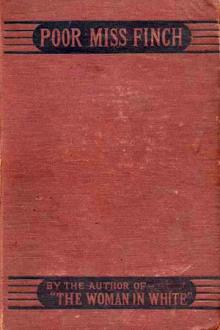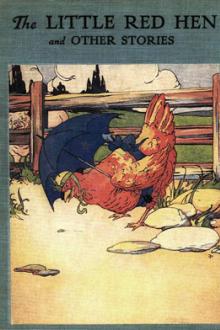Poor Miss Finch, Wilkie Collins [the little red hen read aloud TXT] 📗

- Author: Wilkie Collins
- Performer: -
Book online «Poor Miss Finch, Wilkie Collins [the little red hen read aloud TXT] 📗». Author Wilkie Collins
He followed me, and stood over me—he summed her up in stern quiet tones, which carried conviction into my mind, and made me feel ashamed of myself for having ever regretted her.
“Look back for the last time, Lucilla, at what this woman has said and done. You will find that the idea of your marrying Nugent is, under one form or another, always present to her mind. Present alike when she forgets herself, and speaks in a rage—or when she reflects, and speaks with a purpose. At one time, she tells you that you would have fallen in love with Nugent, if you had seen him first. At another time, she stands by while Nugent is personating me to you, and never interferes to stop it. On a third occasion, she sees that you are offended with me; and triumphs so cruelly in seeing it, that she tells me to my face, your prospect would have been a much happier one, if you had been engaged to marry my brother instead of me. She is asked in writing, civilly and kindly asked, to explain what she means by those abominable words? She has had time to reflect since she spoke them; and what does she do? Does she answer me? No! She contemptuously tosses my letter into the fireplace. Add to these plain facts what you yourself have observed. Nugent has all her admiration; Nugent is her favorite: from the first, she has always disliked and wronged me. Add to this, again, that Nugent (as I know for certain) privately confessed to her that he was himself in love with you. Look at all these circumstances—and what plain conclusion follows? I ask you once more—Is Madame Pratolungo a slandered woman? or am I right in warning you (as you once warned me) to beware of her?”
What could I do but own that he was right? It was due to him, and due to me, to close my heart to her, from that moment. Oscar sat down by me, and took my hand.
“After my experience of her in the past,” he went on softly, “can you wonder that I dread what she may do in the future? Has no such thing ever happened as the parting of true lovers by treachery which has secretly undermined their confidence in each other. Is Madame Pratolungo not clever enough and unscrupulous enough to undermine our confidence, and to turn against us, to the wickedest purpose, the influence which she already possesses at the rectory? How do we know that she is not in communication with Nugent at this moment?”
I stopped him there—I could not endure it. “You have seen your brother,” I said. “You have told me that you and he understand each other. What have you to dread after that?”
“I have to dread Madame Pratolungo’s influence, and my brother’s infatuation for you,” he answered. “The promises which he has honestly made to me, are promises which I cannot depend on when my back is turned, and when Madame Pratolungo may be with him in my absence. Something under the surface is going on already! I don’t like that mysterious letter, which is only to be shown to you on certain conditions. I don’t like your father’s silence. He has had time to answer your letter. Has he done it? He has had time to answer my postscript. Has he done it?”
Those were awkward questions. He had certainly left both our letters unanswered—thus far. Still, the next post might bring his reply. I persisted in taking this view; and I said so to Oscar. He persisted just as obstinately on his side.
“Suppose we go on to the end of the week,” he said; “and still no letter from your father comes, for you, or for me? Will you admit, then, that his silence is suspicious?”
“I will admit that his silence shows a sad want of proper consideration for you,” I replied.
“And there you will stop? You won’t see (what I see) the influence of Madame Pratolungo making itself felt at the rectory, and poisoning your father’s mind against our marriage?”
He was pressing me rather hardly. I did my best, however, to tell him honestly what was passing in my mind.
“I can see,” I said, “that Madame Pratolungo has behaved most cruelly to you. And I believe, after what you have told me, that she would rejoice if I broke my engagement, and married your brother. But I can not understand that she is mad enough to be actually plotting to make me do it. Nobody knows better than she does how faithfully I love you, and how hopeless it would be to attempt to make me marry another man. Would the stupidest woman living, who looked at you two brothers (knowing what she knows), be stupid enough to do what you suspect Madame Pratolungo of doing?”
I thought this unanswerable. He had his reply to it ready, for all that.
“If you had seen more of the world, Lucilla,” he said, “you would know that a true love like yours is a mystery to a woman like Madame Pratolungo. She doesn’t believe in it—she doesn’t understand it. She knows herself to be capable of breaking any engagement, if the circumstances encouraged her—and she estimates your fidelity by her knowledge of her own nature. There is nothing in her experience of you, or in her knowledge of my brother’s disfigurement, to discourage such a woman from scheming to part us. She has seen for herself—what you have already told me—that you have got over your first aversion to him. She knows that women as charming as you are, have over and over again married men far more personally repulsive than my brother. Lucilla! something which is not to be out-argued, and not to be contradicted, tells me that her return to England will be fatal to my hopes, if that return finds you and me with no closer tie between us than the tie that binds us now. Are these fanciful apprehensions, unworthy of a man? My darling! worthy or not worthy, you ought to make allowances for them. They are apprehensions inspired by my love for You!”
Under those circumstances, I could make every allowance for him—and I said so. He moved nearer to me; and put his arm round me.
“Are we not engaged to each other to be man and wife?” he whispered.
“Yes.”
“Are we not both of age, and both free to do as we like?”
“Yes.”
“Would you relieve me from the anxieties under which I am suffering, if you could?”
“You know I would!”
“You can relieve me.”
“How?”
“By giving me a husband’s claim to you, Lucilla—by consenting to marry me in London, in a fortnight’s time.
I started back, and looked at him in amazement. For the moment, I was incapable of answering in any other way than that.
“I ask you to do nothing unworthy of you,” he said. “I have spoken to a relative of mine living near London—a married lady—whose house is open to you in the interval before our wedding day. When your visit has been prolonged over a fortnight only, we can be married. Write home by all means to prevent them from feeling anxious about you. Tell them that you are safe and happy, and under responsible and respectable care—but say no more. As long as it is possible for Madame Pratolungo to make mischief between us, conceal the place in which you are living. The instant we are married reveal everything. Let all your friends—let all the world know that we are man and wife!”
His arm trembled round me; his face flushed deep; his eyes devoured me. Some women, in my place, might have been offended; others might have been flattered. As for me—I can trust the secret to these pages—I was frightened.
“Is it an elopement that you are proposing to me?” I asked.
“An elopement!” he repeated. “Between two engaged people who have only themselves to think of.”
“I have my father to think of; and my aunt to think of,” I said. “You are proposing to me to run away from them, and to keep in hiding from them!”
“I am asking you to pay a fortnight’s visit at the house of a married lady—and to keep the knowledge of that visit from the ears of the worst enemy you have, until you have become my wife,” he answered. “Is there anything so very terrible in my request that you should turn pale at it, and look at me in that frightened way? Have I not courted you with your father’s consent? Am I not your promised husband? Are we not free to decide for ourselves? There is literally no reason—if it could be done—why we should not be married tomorrow. And you still hesitate? Lucilla! Lucilla! you force me to own the doubt that has made me miserable ever since I have been here. Are you indeed as changed towards me as you seem? Do you really no longer love me as you once loved me in the days that are gone?”
He rose, and walked away a few paces, leaning over the parapet with his face in his hands.
I sat alone, not knowing what to say or do. The uneasy sense in me that he had reason to complain of my treating him coldly, was not to be dismissed from my mind by any effort that I could make. He had no right to expect me to take the step which he had proposed—there were objections to it which any woman would have felt in my place. Still, though I was satisfied of this, there was an obstinate something in me which would take his part. It could not have been my conscience surely which said to me—‘There was a time when his entreaties would have prevailed on you; there was a time when you would not have hesitated as you are hesitating now?’
Whatever the influence was, it moved me to rise from my seat, and to join him at the parapet.
“You cannot expect me to decide on such a serious matter as this at once,” I said. “Will you give me a little time to think?”
“You are your own mistress,” he rejoined bitterly. Why ask me to give you time? You can take any time you please—you can do as you like.”
“Give me till the end of the week,” I went on. “Let me be sure that my father persists in not answering either your letter or mine. Though I am my own mistress, nothing but his silence can justify me in going away secretly, and being married to you by a stranger. Don’t press me, Oscar! It isn’t very long to the end of the week.”
Something seemed to startle him—something in my voice perhaps which told him that I was really distressed. He looked round at me quickly, and caught me with the tears in my eyes.
“Don’t cry, for God’s sake!” he said. “It shall be as you wish. Take your time. We will say no more about it till the end of the week.”
He kissed me in a hurried startled way, and gave me his arm to walk back.
“Grosse is coming to-day,” he continued. “He mustn’t see you looking as you are looking now. You must rest and compose yourself. Come home.”
I went back with him, feeling—oh, so sad and sore





Comments (0)